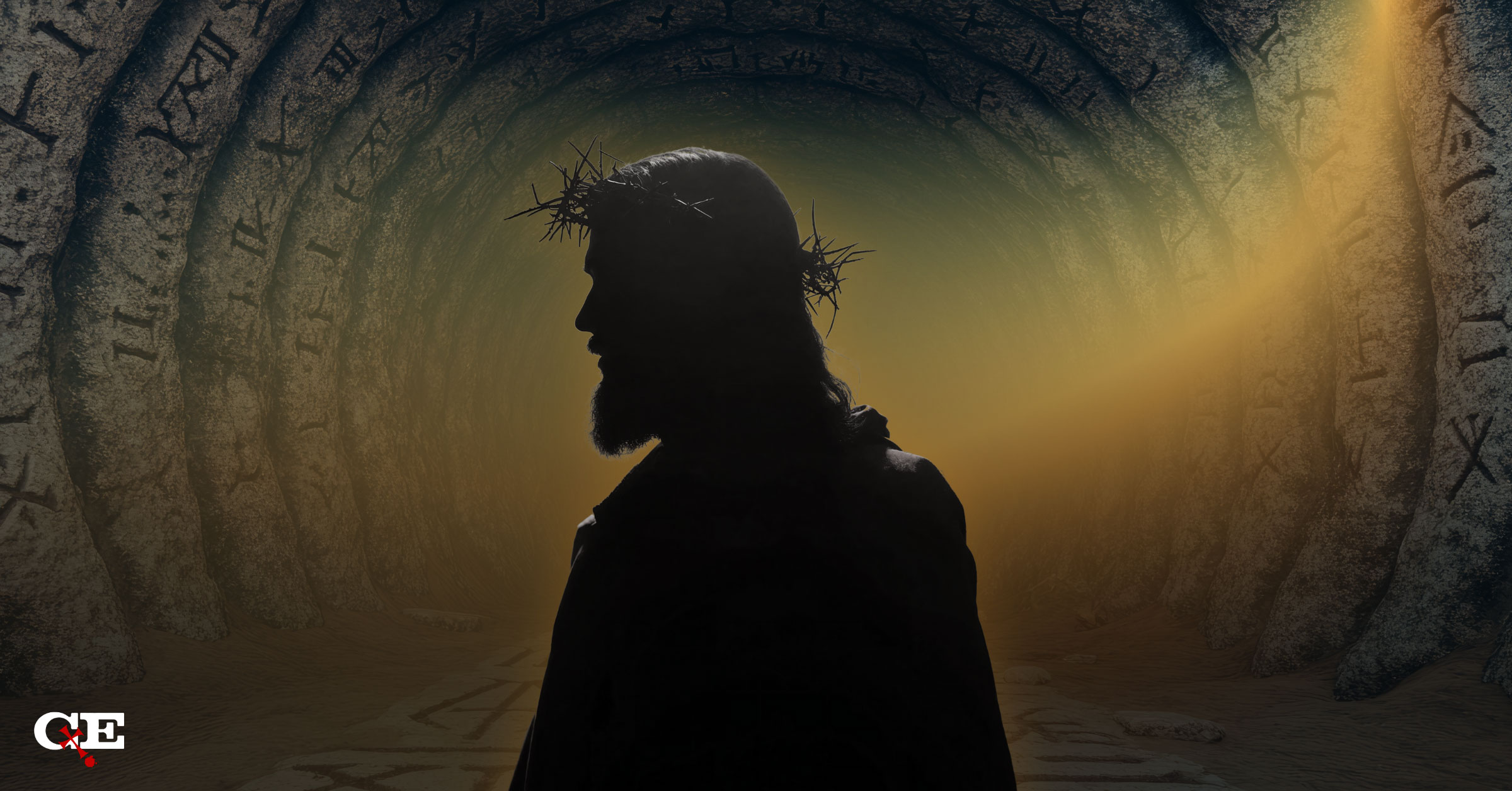[Editor’s Note: This article first appeared in 2011 in Christian Research Journal, vol. 34, no. 6, and reprinted online in 2014 at: https://www.equip.org/articles/ambiguous-islam/. Any additions are in [brackets]].
Usama Bin Laden was a moderate. Right?
Was he not a tragic peace-loving hero with a grand vision for a democratic Afghanistan? Like a photograph overexposed, zeal overcame him, his greatness o’er shadowed by bright dots of violence. Seal Team Six made sure his violence met violence and his vision was ended. We might expect that portrayal from Afghan extremists or Hamas radicals. But that’s also the Bin Laden you find in the short-lived May 4 press release from moderate group Muslim American Society (MAS). They say of him, “I do not believe that any human being relished the terror and the loss of blood that came with his death.” [1] Cooler heads prevailed and MAS retracted this press release six days later. Smart move. This statement does not officially reflect MAS. But this press release does show that MAS either has a bad jokester in its midst, or there are sympathies for UBL [Usama Bin Laden] among its members. MAS has already raised concern elsewhere for, apparently, serving as a public front to the political-Islam group the Muslim Brotherhood.[2] Bear in mind that MAS is the largest official Muslim advocacy group in America.
Consider another case. The popular U.S. based group CAIR, the Council of American Islamic Relations, lost in court when accused of financial ties to (Palestinian terrorist group) Hamas. CAIR has yet to call Hamas or the Lebanon-based Hezbollah “terrorist organizations.”[3] Having headquarters in Washington DC and branches in twenty US states, CAIR is a major player. CAIR and MAS are two of the biggest, most respectable Muslim organizations in America, and even they cannot shake the burrs of extremism. These two groups illustrate Islam’s often-futile effort to be moderate. To many of us, “moderate Islam” looks oddly plastic, like fake food. Many try to cook up a “moderate Islam,” palatable to the world and authentic to Muslim tastes, but MAS, CAIR, and others have already spit in the soup. Consider some of the following attempted recipes.
AVERAGES
“Moderate Islam” could mean the majority of world Muslims caught straddling non-Islam and fundamentalist Islam. They don’t speak Arabic, live under sharia law, or promote religious violence.[4] Otherwise they may be poster-children for Islam. This is moderation by averages.
The problem with this definition is that if a person qualifies as Muslim, his religion must qualify as Islam. But Islam isn’t defined by how some Muslims happen to act, but by texts, traditions, and Muhammad’s example. The Islamic world could stray from orthodox Islam and yet there would remain, in texts and traditions, a way to tell Islam from imitations. A self-proclaimed Muslim may claim nonviolence, but claims count little if he’s also a “hardened secular” (i.e., Tarek Fatah).[5] Unless one’s religion is Islam, he hardly counts for moderate Islam.
NONVIOLENCE
Others aren’t “average,” they just reject violence while supporting most everything else of radical Islam. These questionable “moderates” may advocate worldwide Muslim expansion so long as it’s nonmilitant; forcing nations into sharia law, so long as it’s nonmilitant; and attacking Judeo-Christian influence in the western world, so long as it’s nonmilitant.
However, people may be peaceable themselves, but dangerous in other ways. They may justify Islam’s bloody history of militant expansionism. They may support Sharia law, anti-Semitism, or suppression of women. This sense of “moderate” isn’t helpful. Such “moderates” stretch the term beyond credulity.
Equally guilty are those who stoke and those who light the flames. One supposed bridge builder, Muslim Abid Ullah Jan, swears off Islamic violence in one turn, but in the next employs the same rhetoric typical of jihadists. He says Islam was not behind the 2006 terrorist plots in Toronto and London and then proceeds to list (purported) beliefs he shares with terrorists: “9/11 was an inside job” and “[George W.] Bush and [Tony] Blair are neck deep in the blood of innocent Muslims”; Israel is an “illegitimate racist state”; “the present world order is unjust”; “aggression and oppression” such as American “colonial fascism…should be resisted”; and “Muslims…should struggle to live by Islam, free from colonial interference.”[6] He does reject murdering “innocent civilians.”[7] But in distributing guilt so broadly, no innocents remain. Now, I’m not attempting to justify the present world order, and Jan does well in saying it’s wrong to murder innocent civilians, but his words serve to inflame and aggravate while he indicts all of America and all of Israel as guilty. Does that justify the murder of Americans and Jews? The silence is deafening.[8]
Jan’s “moderation” is more dangerous than helpful. He translates “jihadism” into “freedom fighting” and “the American way” into “terrorism.” Yes, he rebukes violence against “innocent civilians,” but American military aren’t civilians, so they can be killed justifiably, whether or not they are on duty. American causes, by his thought, are borne out of oppressive colonialism, so American causes deserve violent opposition. Jan goes farther than modest critique, stretching his anti-Americanism to cover most every American cause that can be named. His “moderate” positioning dissolves to nothing. Jan’s rhetoric is dangerously immodest and hardly “moderate.” Relabeled dynamite is no less explosive. If Jan does not want to start more fires, he should speak with more light and less heat.
MODERATELY MUSLIM
Still others see “moderate” as a compromise, like “halfhearted” or “nominal.” Turkey’s prime minister, [Recep] Erdogan, explains, “The term ‘Moderate Islam’ is ugly and offensive; There is no moderate Islam; Islam is Islam.”[9]
Despite objections, the lingo has stuck. The public has appropriated the term. Plus, Erdogan is arguably Islamist himself (depending on one’s definition), representing a far more fundamentalist and Islamocentric Turkey than the prior (modern) heritage of [Mustafa Kemal] Ataturk.[10] “Moderate” may be offensive to him, but apt for other Muslims who distrust Hamas more than he does or who prefer the “old” Turkey.
While some take offense at the term, perhaps it need not offend. “Moderate” is relative to whatever it divides. It need not divide committed Muslims from noncommitted Muslims. A Muslim may be committed and willing to die for the faith but would never kill for the faith. One may be extreme about learning Arabic but moderate about sharia or jihad. The elephant in the living room is not “extremely faithful” or “extremely peaceful.” The elephant is terrorism; that’s the extreme.
IS “MODERATE” ISLAM REAL?
Admitting the elephant in the living room, and that it’s wearing a bomb vest, it’s evident we probably wouldn’t be debating this phrase if not for jihadism. At minimum, “moderate” means peaceable, broadly nonviolent in word and deed. This person opposes forced conversion and militant expansion, and allows violence only for self-defense or for [restrained] police and military [measures]. Still, we must ask, Is “Moderate Islam” a Muslim category or is it more diplomacy obscuring danger with thin veneers of misinformation?[11] Scholarly talk persists, often to legitimize “moderate” Islam, but rarely does it drown out the militant minority that has hijacked the conversation.
Surely the extremists aren’t all of Islam; that’s evident. But they are some of Islam. So the suspicion remains. Perhaps the “moderate” category is a foreign intrusion, not a native distinction. Even with the important contributions of Islam in world culture, those would seem to be the attractive face splattered in blood after centuries of violence.[12] Were such violence a medieval memory, this question would be outdated. But hostilities are hot. The search for a moderate Islam is as important as ever.
Scholars such as Muqtedar Khan (Debating Moderate Islam) and Daniel Pipes (Militant Islam Reaches America) say moderate Islam is possible, and Islam can trade its masked militancy for enlightened lenses. Zuhdi Jasser (the film Third Jihad), a Muslim, actively campaigns against jihadism. Yet others, such as Wafa Sultan (A God Who Heals) and Ayaan Hirsi Ali (Infidel and Submission), living under threat of death for leaving Islam, argue that Islam is fundamentally violent, peaceable only in its compromised forms. While it’s true that at least one (small, lonely, but encouraging) Muslim organization openly rebukes jihadism (Free Muslim Coalition[13]). Islam does not seem reformed enough in width or depth to escape that reputation. Whatever innovations Islam has had, a dogged contingency of fundamentalist militant Islam persists, linking it back to terrorism.
IS MILITANCY HERETICAL?
Were that militancy a baseless offshoot then we could slough it off as cult aberration—like Christianity rejecting Mormon polygamy. That practice does not fall within historic Christianity.
But jihad is Islamic. It is an Arabic term with a well-known dual meaning of greater jihad (inner struggle of self-discipline) and lower jihad (militancy against former and non-Muslims). Its roots run deep in the Qur’an and Hadith.[14] Historically there’s a rich tradition of Islam spreading the faith coercively in threats and warfare. Today, numerous bomb attempts and hijackings often begin with shouts of “Allahu Akbar.” Border violence, like in Chechnya, is often jihadist. Iran’s aggression is hardly a secret. Militancy in Al Qaeda and the Muslim Brotherhood in Egypt, Syria, and Libya is well known. The newly reopened Gaza Strip [as of 2011] promises anti-Israel violence.[15] Pakistan arose from violent Islamic independence movements. Nigeria is torn over sharia courts. Recent riots in France were by largely disenfranchised Muslim youth who saw France’s ban on head wraps as “just cause” for violence (see Surah 17:33).
These scenes on the world stage are diplomatic nightmares and to even begin understanding them, we must understand the doctrine of jihad. Islam traditionally teaches (1) land claims by Islam cannot be revoked;[16] (2) Islam will spread and conquer the world;[17] and (3) God uses His followers to advance His kingdom through warfare.[18]
POINTING FINGERS
One may try to justify immoderate violence as the backlash from American or colonial abuses. But Islam is older than these. Abu Ghraib, Guantanamo Bay, Operation Desert Storm, Operation Iraqi Freedom, Operation Enduring Freedom (Afghanistan)—these are historical newborns. Islam was violently engaged with its neighbors before Columbus set sail and many centuries before modern Israel was formed. Jihadist roots are centuries deep before the Declaration of Independence was a glimmer in our founding father’s eyes. Of course, superpowers get no free pass, but neither should their supposed victims be allowed free rein for destructive responses. Even if America needs housecleaning, jihadism, with blood spattered throughout its own house, is in no condition to condemn the structures built by others. Jihadism must justify itself as an independent entity, not as a fruitless visceral reaction with cures more brutal than any disease.
Violence is the native history of Islam no matter its neighbors. The Prophet Muhammad himself, living by the sword as much as the word, led seventy-four raids, expeditions, and battles.[19] Sure the Qur’an has peaceable passages (4:36; 5:32), but Muslim scholarship widely admits they are trumped or “abrogated” with militancy by the later Medinan verses.[20] After Muhammad, Islam continued its militant spread through his successors. Though Islam is not supposed to force conversion (2:256), countless people have faced the trilemma: (1) pay the jizya (subjugation tax ransoming one’s life), (2) convert to Islam, or (3) die. Moreover, I know of no widespread reformation where Islam outgrew its old warring ways. Whenever a peaceable Muslim seedling sprouts, roots movements, like weeds, sprout up to choke back its growth.
So we see that militancy is a common ingredient in historic Islam. There may be a strand of nonviolent, moderate Islam but there is good reason to doubt its claim over all Muslims given Islam’s bloody text and traditions. Islam needs real reformation if the world is going to take seriously its claims of peace and moderation.
REFERENCES:
[1] [Editor’s Note: “The quote, ‘I do not believe that any human being relished the terror and the loss of blood that came with his death,” is part of a retracted press release issued by the Muslim American Society (MAS) on May 4, 2011, following the death of Usama Bin Laden. The press release was later withdrawn by the organization.” Source: Google AI.]
[2] Noreen S. Amed-Ullah, Sam Roe, and Laurie Cohen, “A Rare Look at Secret Brotherhood in America,” Chicago Tribune (online), 19 September 2004. Accessed 22 October 2011 at: http://www.chicagotribune.com/news/watchdog/chi-0409190261sep19,0,3008717.story.
[3] CAIR has become known, of late, as a front organization for Hamas, according to testimony from FBI Agent Lara Burns in a juried trial on anti-Israeli terrorism (Jason Trahan, “FBI: CAIR is a Front group, and Holy Land Foundation Tapped Hamas Clerics for Fundraisers,’” Dallas Morning News (online), October 2008; http://crimeblog.dallasnews.com/archives/2008/10/fbi-cair-is-a-front-group-and.html, (Accessed October 29, 2011). For more discussion of CAIR as a front organization for Hamas and its unwillingness to call Hamas and Hezbollah “terrorist organizations” see the website www.anticair-net.org.
[4] Dr. Wafa Sultan suggests Islam is fundamentally Arabic in its culture and language; yet ninety-five percent of Islamic teaching remains untranslated in the Arabic (Dr. Wafa Sultan and Dr. Daniel Pipes, “Moderate Islam: Western Ally or Western Myth?” [debate], December 1, 2009, FORA.tv.; http://fora.tv/2009/12/01Moderate_Islam_ Western_Myth [accessed December 20, 2010]). She estimates eighty percent of world Muslims are non-Arabic in descent, language, and location and so have only a compromised sense of Islam (ibid.). It’s well known that many Muslims do not read or speak Arabic. That language barrier enables theological compromise. “Arabic unified the Muslim countries as it spread to every land that embraced Islam.…Muslim societies that are ignorant of Arabic are in general less knowledgeable about Islam…[and] more prone to stray from the straight path.” (Fatima Barkatullah, “Arabic: The Key to Understanding the Qur’an,” Islamic Network [UK], n.d.; http://www.islaam.net/main/display.php?id=503&category=2 [accessed December 20, 2010]).
[5] Tarek Fatah, “From an Ex-Muslim True Islamophobia,” National Post, March 12, 2010, http://network.nationalpost.com/NP/blogs/ fullcomment/archive/2010/03/12/tarek-fatahfroman-ex-muslim-true-islamophobia.aspx (accessed December 20, 2010).
[6] Abid Ullah Jan, “Why the Terrorist Plots Are False,” Media Monitors, August 13, 2006; http://usa.mediamonitors.net/content/view/full/34172 (accessed December 1, 2010).
[7] Ibid.
[8] Ibid. Jan’s words might be read in a moderate way, except his overall tone is blatantly inflammatory. Moreover, this tactic of qualifying people and civilians with “innocent” (as opposed to guilty people or civilians) has been exposed already with CAIR. CAIR coordinated a fatwa stating, “Islam strictly condemns religious extremism and the use of violence against innocent lives. There is no justification in Islam for extremism or terrorism. Targeting civilians’ life and property through suicide bombings or any other method of attack is haram or forbidden – and those who commit these barbaric acts are criminals, not martyrs.” (CAIR, “25 Facts about CAIR,” CAIR.com; http://www.cair.com/AboutUS/ 25FactsAboutCAIR.aspx (accessed October 22, 2011). This language sounds innocent enough until it is shown that CAIR has refused to call Hezbollah and Hamas terrorist organizations. Those two groups have claimed responsibility for dozens of known terrorist attacks. But, apparently, CAIR refuses to consider those activities as “extremism” or “criminal.”
[9] Recep Tayyip Erdogan, interview (Milliyet, Turkey: Kanal D, August 21, 2007); http://www.thememriblog.org/turkey/blog_personal/en/2595.htm (accessed December 1, 2010).
[10] Mustafa Kemal Ataturk, president of Turkey from 1923–1938, modernized Turkey. Despite his influence, Turkey has become Islamocentric under Erdogan through his Hamas affiliations and sympathy for sharia law (Dr. Muhammad Shamsaddin Megalomattis, “Why Westernized, Secular and Democratic Turks Voted for Erdogan,” American Chronicle, July 23, 2007, http://www.americanchronicle.com/articles/view/32902. See also, “Turkey’s Erdogan Bears Responsibility In Flotilla Fiasco” (editorial), Washington Post, June 5, 2010, http://www.washingtonpost.com/wp-dyn/content/article/2010/06/04/AR2010060404806.html).
[11] See Ibn Warraq,“The Dogmatic Islamophilia of Western Islamologists,” New English Review (April 2010); http://www.newenglishreview.org/custpage.cfm/frm/61227/ sec_id/61227 (accessed December 22, 2010).
[12] The Muslim Renaissance is a case in point.
[13] http://www.freemuslims.org/. See also the YouTube video at http://www.youtube.com/watch?v=VQHYbguJkKM.
[14] Jihad, abrogation, and interpretation are much debated. Nevertheless, there are allegedly 164 verses from the Qur’an (not counting the Hadith) that support militant jihad. See Yoel Natan’s lists at http://www.answering-islam.org/Quran/Themes/jihad_passages.html. Examples include: Surah 2:190–191: “Fight in the cause of Allah those who fight you…191 and slay them wherever you catch them, and turn them out from where they have turned you out.” (Qur’anic quotes are from the Yusuf Ali translation [2001] unless otherwise noted.) Surah 2:216: “Fighting is prescribed for you.” Surah 9:5: “Fight and slay the Pagans wherever you find them, and seize them, beleaguer them and lie in wait for them in every stratagem (of war).” Surah 9:14: “Fight them [unbelievers] and Allah will punish them by your hands.”
[15] [Editor’s Note: The October 7, 2023 war in Gaza confirms that suspicion]
[16] Surah 9:39. “Agreed are the Salaf, the Pious Predecessors [early Caliphate], all people of understanding, and the Muhaditheen that in all ages of Islam: ‘That if a piece of Muslim land the size of a hand span is infringed on, then jihad becomes Fard Ayn (global obligation) on every Muslim male and female.” Shaheed Abdullah Azzam, “Defence of the Muslim Lands” (Brothers in Ribatt translation), n.d.; http://www.kalamullah.com/ Books/defence.pdf (accessed December 26, 2010).
[17] Surahs 61:9, 48:28, and 9:33.
[18] Surah 9:14.
[19] James Arlandson, “The Truth about Islamic Crusades and Imperialism,” American Thinker, http://www.americanthinker.com/2005/11/ the_truth_about_ islamic_crusad.html (November 27, 2005).
[20] Surah 2:106, 16:101, 13:39. Arthur Jeffery, Islam: Muhammad and His Religion (Indianapolis: The Bobbs-Merrill Company, 1958), 66.
Recommended Resources:
Answering Islam by Dr. Frank Turek (DVD Set, Mp4 and Mp3)
Counter Culture Christian: Is the Bible True? by Frank Turek (Mp3), (Mp4), and (DVD)
Jesus, You and the Essentials of Christianity by Frank Turek (INSTRUCTOR Study Guide), (STUDENT Study Guide), and (DVD)
How Can Jesus be the Only Way? Mp4, Mp3, and DVD by Frank Turek
Dr. John D. Ferrer is a speaker and content creator with Crossexamined. He’s also a graduate from the very first class of Crossexamined Instructors Academy. Having earned degrees from Southern Evangelical Seminary (MDiv) and Southwestern Baptist Theological Seminary (ThM, PhD), he’s now active in the pro-life community and in his home church in Pella Iowa. When he’s not helping his wife Hillary Ferrer with her ministry Mama Bear Apologetics, you can usually find John writing, researching, and teaching cultural apologetics.
Originally posted at: https://bit.ly/4oiQHJH











